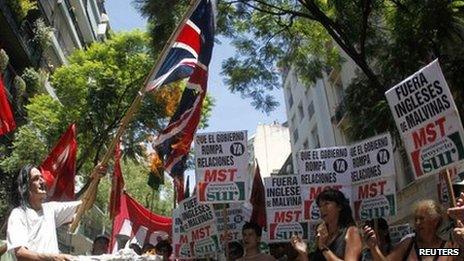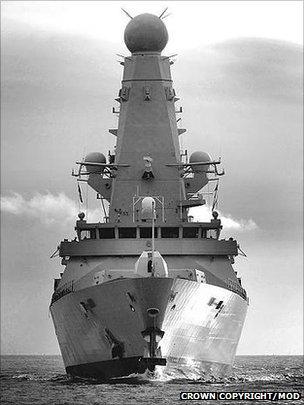Falkland tensions grow ahead of invasion anniversary
- Published

There is a growing support among Argentines for the government's more aggressive approach on the issue
Tensions over the Falkland Islands have been increasing ahead of the 30th anniversary of Argentina's invasion in 1982.
The latest escalation was prompted by the decision of Mercosur, a South American trading bloc, to close its ports to ships flying the Falkland Islands flag in December.
When British Prime Minister David Cameron then accused Argentina of "colonialism", the Argentine Senate passed a motion condemning his comments.
There were also demonstrations - with the Union flag burning - outside the British embassy in Buenos Aires.
Then the Royal Navy announced that it was sending the destroyer HMS Dauntless to the South Atlantic, off the Falklands.
The British government said the move was routine, but it will do little to ease tensions in the region.
National consensus

HMS Dauntless is among the largest and most powerful air defence destroyers
The status of the islands, known as the Malvinas in Argentina, is still a very sensitive issue for Buenos Aires.
In the capital, it is common to see posters highlighting the country's claim to the islands. Many Argentine cities also have monuments to the war, in which more than 600 soldiers died.
It is not uncommon either to see youngsters with tattoos of a Falklands map in the colours of the Argentine flag.
At a political level, feelings are no less intense.
National politics may be extremely polarised, but there is consensus between the government and the opposition over the country's claim to the islands.
"It is the centrepiece of Argentina's foreign policy," says Jorge Battaglino, lecturer in international relations at Torcuato di Tella University in Buenos Aires.
Growing support
Analysts agree that commemorations of the war will be more prominent this year than ever before.
Some say this is because it is the 30th anniversary. But it also coincides with a change of tack by the government, which is pushing more forcefully for talks with the UK.
Britain insists it will not open negotiation on the Falklands, as most islanders wish to retain British sovereignty.
Pollster Ibarometro says support among Argentines for the country's claim to the islands is traditionally at about 65-70%, but that Mr Cameron's comments boosted that to nearly 74%.
Ibarometro's director Pablo Lopez also says that there is growing support for the government's more aggressive approach.
"Since 2009, backing for the government's strategy has jumped from about 40% to 67%," he says.
A military government was in power in Argentina at the time of the 1982 invasion.
It was a time of social unrest, and the state was leading its so-called "dirty war" - a crackdown on left-wing activists which left an estimated of 30,000 people dead.
Yet support for the war was high.
For years, this has complicated the issue for Argentines, who have tried to disassociate support for the Falklands from support for the military dictatorship.
"People today have managed to separate both views," says sociologist Vicente Palermo.
"The Malvinas are seen as a national cause, regardless of whether there was a war over the islands sparked by an unpopular military government."
Cameron factor
Britain has held the islands since the 1830s, but Argentina insists it has a prior claim.

The Falklands dispute is an old national cause in Argentina
"It is an old national cause, and the military took advantage of this popular feeling to try to maintain their grip on the country," says sociologist Atilio Boron.
"The war only managed to delay the possible start of negotiations between Argentina and Britain," he adds.
After the war, Argentina suffered decades of internal economic and political strife, but the relative calm of the past decade has allowed foreign policy to come to the fore.
The election of Nestor Kirchner as president in 2003 marked an increase in Argentina's efforts to claim the islands, and the government has since actively sought support from other nations in the region and the UN.
Mr Kirchner and his wife Cristina - the current president - grew up in the Argentine Patagonia, in the south of the country, where the issue runs high because of the relative proximity to the disputed territory.
There is some debate in Argentina as to whether this explains the government's interest in the issue.
Some, like Mr Palermo, say that the official position is just an accurate representation of public opinion.
He says President Fernandez may also be using the Falklands to deflect attention from domestic issues.
Not everyone agrees.
"Why would the president do that? She has just been re-elected with strong support, the economy is growing and her popularity is high," says Mr Battaglino.
"It is David Cameron who is trying to deflect attention from domestic issues," says Mr Boron.
"The UK's economy is no better than Argentina's. It was not Buenos Aires that had social unrest and riots last year, but London," he adds.
The Argentine government believes the recent support from other countries in the region to their claim to the islands may have improved the prospects of Britain agreeing to open negotiations on the issue.
But so far, from the Foreign Office in London, there has been no indication of any change in the British stance.
- Published31 January 2012
- Published31 January 2012